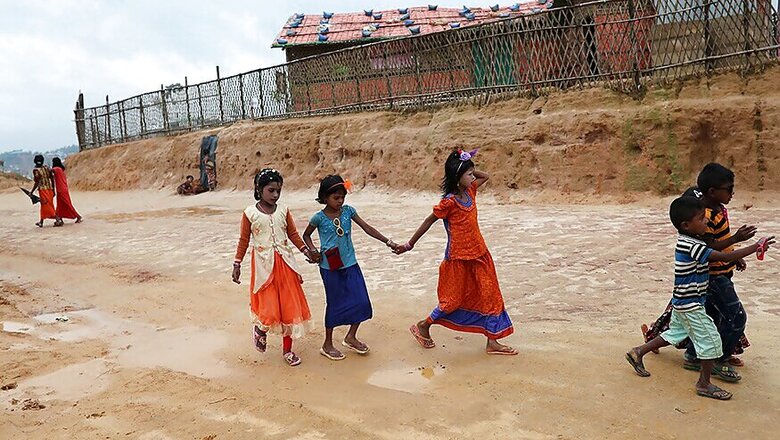
views
Dhaka: The United Nations' refugee agency and Bangladesh authorities on Tuesday started to consult more than 3,000 Rohingya refugees from Myanmar to determine if any want to return home, officials said, as a fresh repatriation bid was launched.
More than 730,000 Rohingya fled Rakhine for neighbouring Bangladesh after a military-led crackdown in August 2017 the United Nations has said was perpetrated with "genocidal intent", but many refugees refuse to go back, fearing more violence.
Myanmar cleared 3,450 people to return, from a list of more than 22,000 provided by Bangladesh, authorities said. "The intentions surveys are beginning today," Louise Donovan, a UNHCR spokeswoman in the Cox's Bazar district of Bangladesh, told Reuters.
"Together, the government of Bangladesh and UNHCR will ask these refugees to come forward and discuss the option of repatriation." The agency will hold a second confidential interview with those who express a wish to return, she added, to discuss their intentions, and ensure the decision is voluntary, she said.
"They will be asked to complete a voluntary repatriation form," she added. A representative of Bangladesh's refugee relief effort will also attend the interviews, a government official said.
"The UN refugee agency has started interviewing the Rohingya on the list," Mohammad Abul Kalam, the country's refugee relief and repatriation commissioner, said by telephone. "Transit centres, transport facilities…everything is ready to start the repatriation on Thursday," he added.
The U.N. Security Council is set to discuss the latest repatriation plan behind closed doors on Wednesday, at the request of Belgium, Britain, France, Germany and the United States, diplomats said.
British charity Oxfam called for the international community to step up diplomatic pressure on Myanmar, and expressed concern about human rights violations there.
"Oxfam remains concerned about human rights violations in Myanmar and hopes the government will take this opportunity to recognise the equal rights of Rohingya people and to lift the heavy restrictions on their movement," said Elizabeth Hallinan, an official of the charity.
"Refugees long to return to their homes, but they tell us they fear going back without rights and justice," Hallinan said in a statement. Last week, Myanmar government spokesman Zaw Htay said officials had scrutinized the list of refugees to determine whether they had lived in Myanmar and had been involved in attacks on the military.
The 2017 crackdown was preceded by attacks on security forces by insurgents calling themselves the Arakan Rohingya Salvation Army, which Myanmar has classified as a terrorist organization.
Previous attempts at persuading Rohingya to return to Rakhine have failed due to opposition from refugees. An effort in November sowed fear and confusion in the camps, and finally failed after refugee protests.



















Comments
0 comment